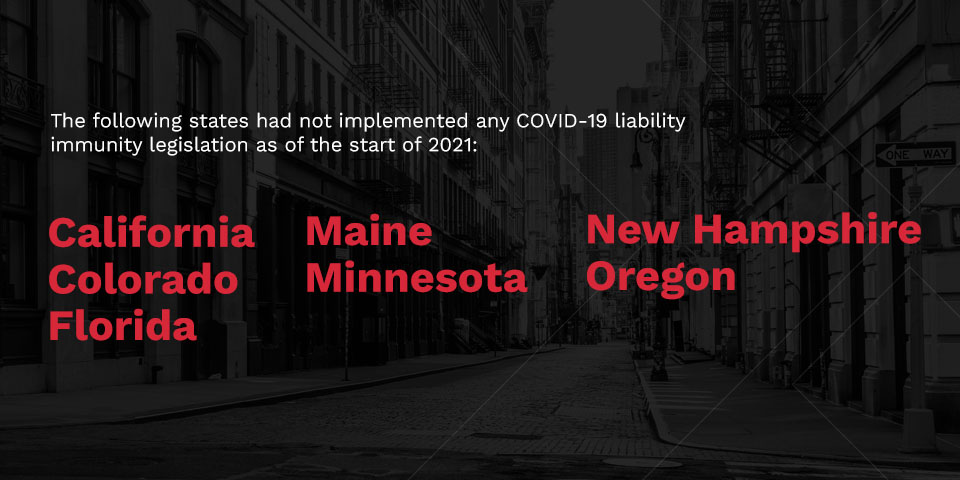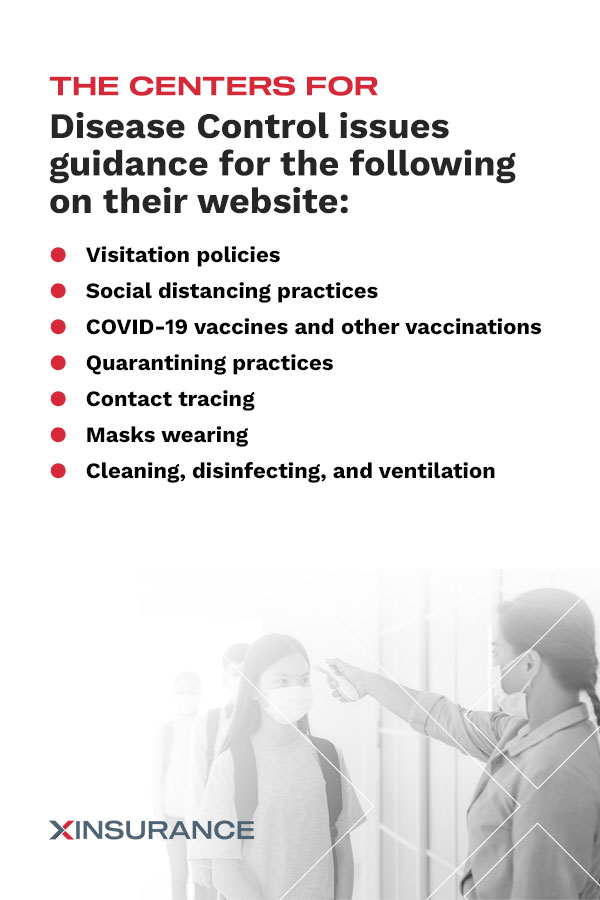
How COVID-19 Is Affecting Nursing Home Liability
The COVID-19 pandemic overwhelmed and devastated nursing home communities all across the United States. Because the residents in these long-term care facilities are older and more likely to have chronic illnesses, the virus proved especially dangerous. The nature of nursing homes makes matters worse as staff switches between patients’ rooms regularly and residents are living in close quarters to one another. This makes for a highly transmittable environment in a place where people are already extra susceptible.
For the long-term care system, Covid-19 has altered much of its protocols as federal and state regulations make changes to operations and the accountability of each facility. Keep reading to learn how the virus is affecting nursing home liability.
COVID-19 & Liability
Traditionally, in the case of nursing homes, the facility must exhibit a high level of care for residents that coincides with healthcare industry standards. When a death or injury takes place within the home, the facility can be held responsible if the care and oversight of the individual fell below these standards.
The loved ones of the deceased or injured may choose to pursue legal action, noting that the care received from the facility was grossly negligent or reckless and was directly linked to the death or injury at hand. The onset of Coronavirus infections changed the dynamics of liability for nursing homes and assisted care facilities.
Governments at both state and federal levels issued immunity for assisted living centers. This was to protect the establishments from being overrun with lawsuits despite not having control over much of the spread of the virus and virus deaths. As of June 2021, 38 states granted immunity to nursing homes to combat COVID-19 related liabilities.
For many states, new legislation or executive orders are active until the pandemic subsides, whenever that may be. Others incorporated a defined expiration date for nursing home immunity provisions so as to not further protections beyond the period of COVID-19. In more than 30 states, nursing homes are protected under government order regarding liability for the following instances:
- Medical malpractice
- Wrongful death
- Personal injury
Two examples of states that experienced a high number of lawsuits against long-term care facilities are Florida and California. These states originally neglected to grant immunity to nursing homes, giving nursing home residents and their loved ones freedom to file lawsuits over the care received during the pandemic.
As of March 2021, Florida Governor Ron DeSantis passed a protective bill for businesses throughout the state, including care facilities, that shields them from lawsuits based on pandemic-related concerns.
Not everyone is sold on the idea of nursing homes and care facilities having these types of protections. Some advocates for the elderly have expressed worry about immunity. Since more than 186,000 nursing home residents and employees have died due to the Coronavirus, there is an overwhelming abundance of people seeking out justice for someone who may have died during the pandemic due to poor care or negligence to comply with safety protocols.
Arguments against nursing home liability protection include:
- Declining quality of care: The inadequate quality of care in nursing homes has been an ongoing point of contention long before the onset of the pandemic. Many are concerned care centers will be less likely to follow guidelines and procedures if they know they are legally protected.
- Injustice: For families that want to pursue legal action against a nursing home, immunity legislation can severely impede the ability to hold the facility accountable.
- Resident protection: Since the COVID-19 pandemic began, visitation limits have left nursing home residents somewhat isolated. Some believe the legal system is the only protection for these individuals as family members and protective services are largely unable to visit. Without outside intervention, residents feel unprotected if something negative were to happen.
Protections for Facilities that Take Care of the Elderly
The federal government enacted the Federal Public Readiness and Emergency Preparedness Act, shortened to the PREP Act in December 2005. The PREP Act is intended to provide the Secretary of the Department of Health and Human Services with the ability to give liable immunity to specific persons or entities with the understanding they follow any regulations and legal requirements.
An additional declaration under the PREP Act was put into effect as of February 4, 2020. This declaration furthers liability coverage of individuals performing medical countermeasures, an addition specifically added due to the onset of Coronavirus.
There have also been many executive orders and bills implemented on the state level to protect long-term care facilities. Some of these protections include:
- Utah’s Senate Bill No. 3002: As part of the Emergency Health Care Access and Immunity Amendments, the Utah legislature granted immunity to health care providers during a public health emergency as of April 2020.
- New York’s Emergency Disaster Treatment Protection Act (EDTPA): This act was implemented in April 2020. It provides immunity from liability to healthcare professionals providing care during COVID-19. This act includes all healthcare workers from EMTs to nursing attendants.
- Mississippi’s Executive Order No. 1471: Issued in April 2020, this order is part of the Mississippi Emergency Management Act. It provides healthcare professionals and facilities immunity from civil liability for injury or death as long as no willful misconduct or crime has been committed.
- Wisconsin’s St. 895.4801: Enacted in April 2020, Wisconsin granted immunity for health care providers during the COVID-19 emergency. This law gives health care workers civil liability coverage as long as the professional is not engaging in reckless or malicious conduct.
- Wyoming’s Bill SF 1002: This bill was enacted in May 2020 and covers all liability with the exception of gross negligence and willful misconduct.
Overall, more than half of all states took added measures to ensure further protection against liability for businesses like nursing homes and long-term care facilities. The following states had not implemented any COVID-19 liability immunity legislation as of the start of 2021:
- California
- Colorado
- Florida
- Maine
- Minnesota
- New Hampshire
- Oregon
Without any legal protections or legislation put into place during COVID, care facilities are vulnerable to civil lawsuits claiming that the care provided to a resident was substandard and directly linked to death or injury. Because the Coronavirus has been especially detrimental to the elderly community despite measures to reduce the spread, this leaves room for a lot of legal action on the part of those who feel that their loved ones were not properly cared for or protected against the infection.
While liability protections are intended to cover health care facilities that are unable to fully combat the Coronavirus, they are also implemented with the understanding that nursing homes and similar establishments are following safety and health guidelines from state and federal governments. To further avoid the possibility of health care providers abusing liability protections, additional legal changes have been made to keep both workers and residents safe.
About Legal Challenges to the Protections
Some people argue that liability protections from the government are wrong and even dangerous for nursing home residents. If health care providers cannot be held accountable for the care they administer to patients, many worry that the quality of care will decrease significantly. This is especially troubling given the current public health crisis. Some are concerned people who live in assisted care facilities will be at risk of malpractice without any legal rights to fight back.
Liability protections have influenced a large debate over the constitutionality of legally covering health care providers from liability. Some of the court cases aimed at combatting immunity liability protection took issue with the following:
- Violation of due process: Many believe that nursing home residents are not being given their fair opportunity at the due process of law since they are unable to hold facilities accountable under liability protection laws.
- Violation of equal protection: It is easy to see why some may see liability immunity as a denial of protection for nursing home residents.
- Violation of separation of power doctrines: Some advocates believe it is an abuse of power to grant immunity.
- Deprivation of civil rights: Some see immunity as a deprivation of the rights of nursing home residents who are legally powerless against health care providers.
- Violations of Americans with Disabilities Act (ADA): Because nursing home residents are likely to have disabilities, especially physical ones, ADA requires accommodations to be made. Advocates are concerned residents’ needs are not being met and this is being protected by liability immunity policies.
However, most cases have utilized gross negligence claims to get nursing homes or care facilities to court, despite their legal immunities. Within the category of gross negligence, the plaintiffs noted the following as motivation for a lawsuit:
- Inadequate staffing due to shortages
- Ineffective or lack of training in infection control
- Failure to communicate with the state or with residents’ families
- Inadequate or lack of protective equipment and testing.
In April 2021, despite originally having protective legislation for nursing homes liability immunity, New York state repealed the Treatment Protection Act that kept health care facilities from taking legal responsibility. This means residents and family members can pursue legal action against nursing homes for malpractice or other wrongdoings without impediment from immunity restrictions.
Meanwhile, Florida passed protection for COVID-19 related civil liability in March 2021, nearly a year after most states issued their litigation. The rules and regulations regarding nursing home immunity are not set in stone. Instead, state governments have repealed and added new implications over the course of the Coronavirus pandemic. The changes have influenced uncertainty from assisted living facilities, nursing homes, and similar establishments.
Because of the fluctuations in legislation, long-term care facilities should actively keep track of immunity laws and find proper methods of operation that keep staff and residents happy and healthy.
Keep reading to learn what health care facilities are able to do to preserve the safety of their community.
What Nursing Homes & Assisted Living Facilities Can Do to Protect Themselves
Nursing homes and assisted living facilities should do their best to protect both residents and staff members, despite what legal liability protections they may have. In order to combat liability claims, the best thing a care facility can do is operate in accordance with safety guidelines.
While nursing homes are inherently susceptible to the negative effects of the coronavirus, facilities should continue efforts to keep residents as safe as possible. There are measures that assisted living facilities can take to reduce the spread of COVID-19 and protect residents.
Following the Centers for Disease Control Guidelines
A great way for nursing homes and assisted living facilities to protect themselves from unwanted lawsuits and the spread of COVID-19 is following up-to-date guidelines from the Centers for Disease Control.
The Centers for Disease Control issues guidance for the following on their website:
- Visitation policies
- Social distancing practices
- COVID-19 vaccines and other vaccinations
- Quarantining practices
- Contact tracing
- Masks wearing
- Cleaning, disinfecting, and ventilation
Following these recommendations will lessen the spread of the Coronavirus and may give grounds for defense in a lawsuit as your facility is taking the necessary and recommended measures to maintain a safe and healthy environment.
Following COVID-19 Guidance from OSHA:
The Occupational Safety and Health Administration of America, shortened to OSHA, has steps specifically for nursing homes and long-term care facilities to follow during the COVID-19 pandemic. These steps are intended to lessen exposure to the virus and keep workers as safe as possible while doing their jobs. Some of the noted safety measures include:
- Having sick workers stay home
- Regularly screening both workers and home residents
- Abiding by the Centers for Disease Control’s guidance for visitations
- Maintaining six feet for social distancing purposes
- Having professionally evaluated HVAC ventilation systems
- Regularly disinfecting all surfaces and common areas using hospital-grade cleaning agents.
- Having employees thoroughly trained on COVID-19 policies and protocol
- Avoid gatherings of workers or residents
By following OSHA’s guidelines, your staff will be better equipped to care for residents. Beyond these safety guidelines, long-term health facilities should be familiar with available insurance options as well.
In addition to any protection given by state and federal legislation, assisted living facilities qualify for special liability insurance coverage. Nursing home insurance is important and necessary for any facility looking to cover both employees and the establishment in the face of civil lawsuits filed for injuries, accidents, or even death. The best way to protect your home against lawsuits and other liability claims is to have a solid insurance plan.
Insurance for Nursing Homes & Assisted Living Facilities
As COVID-19 continues on, nursing homes and other similar care facilities should consider the responsibilities they have to create safe and healthy environments for residents and staff beyond the pandemic. With legal liability protections changing or expiring, facilities should continue following government-issued guidelines and consider further protection.
At XINSURANCE, we offer liability insurance solutions for assisted living facilities and nursing homes that can provide truepeace of mind and added security. Our commercial general and professional liability insurance covers a variety of risks from injury to property damage. To further protect your facility, we offer communicable disease liability coverage created specifically to help nursing homes cope with the pandemic.
Contact XINSURANCE for more information on insurance and learn how we can help!

Rick J. Lindsey hails from Salt Lake City, Utah. He began working in the mailroom of his father’s Salt Lake City insurance firm, getting his introduction to the business that became his lifelong career. Rick J. Lindsey quickly rose through the ranks while working in nearly every imaginable insurance industry job. As an entrepreneur, specialty lines underwriter, claims specialist, risk manager, and a licensed surplus lines broker, Rick J. Lindsey is highly skilled in all levels of leadership and execution. As he progressed on his career path, Rick J. Lindsey discovered an urgent need for insurers willing to write policies for high-risk individuals and businesses. He was frequently frustrated that he could not provide the liability protection these entities desperately needed to safeguard their assets. He also formed the belief that insurance companies acted too quickly to settle frivolous claims. Rick J. Lindsey decided to try a different approach. He started an insurance company and became the newly formed entity’s CEO. This opportunity has enabled Rick J. Lindsey to fill a void in the market and provide a valuable service to businesses, individuals, and insurance agents who write high-risk business. XINSURANCE also specializes in helping individuals and businesses who live a lifestyle or participate in activities that make them difficult for traditional carriers to insure. If you’ve been denied, non-renewed, or canceled coverage, don’t give up quite yet. Chances are XINSURANCE can help.




